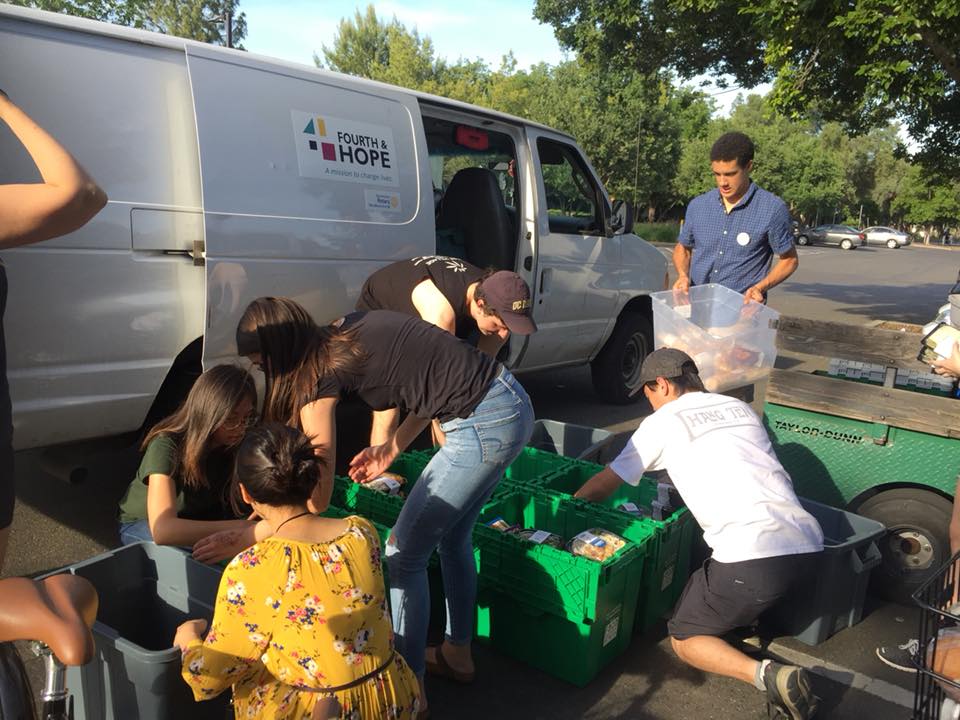Sharing Food Recovery Network with Congress
This winter, our Food Recovery Network (FRN) chapter here, at University of California, Davis (UC Davis), was honored to give a presentation about our organization to U.S. Representative Chellie Pingree of Maine. Pingree, who represents Maine’s first district in Congress, is on the forefront of tackling food waste issues. She recently visited UC Davis to give a joint lecture with UC Davis Professor Ned Spang. When Professor Spang invited us to present to Pingree, we were excited to share about our chapter’s recent growth.
FRN at UC Davis began in 2013 as a modest initiative that relied on two interns with serious bike-riding coordination. Since then, we’ve been able to expand with the help of a small electric cart and access to campus vans. We started “Free Farm Fare” last summer, a program where we recover produce from our city’s Saturday farmers markets and deliver the recovered produce to a student family apartment complex. In our six years, we’ve recovered more than 52,000 pounds, nearly 20,000 of which was recovered last quarter alone.
Spang invited Pingree to UC Davis for a lecture titled “From Farm to Table and Back Again: Innovations to Feed More With Less.” It was part of a new series entitled “Savor: Lectures on Food and Wine.” Pingree’s schedule for the day was full: she visited the Student Farm, lunched with administrative leadership, met with UC Davis’ Food Loss and Waste Collaborative, and heard from us.
Upon arrival, we listened to the end of Pingree’s discussion with the Food Loss and Waste Collaborative. The Collaborative is an initiative Spang leads and is designed to be “the gateway between the general public and UC Davis coalitions, organizations, and initiatives addressing food waste and food loss.” The collaborative consists of researchers and UC Davis faculty who work on food issues.
Collaborative members and Pingree discussed the often complicated relationship between industry, consumer, and government in causing food waste, including the impact of consumer habits. We listened as Collaborative members brought up interesting issues and questions, and Pingree explained her own experience on the policy side with her Food Recovery Act and the Farm Bill, as well as the misconception that food is not an important political topic.
Following this discussion with Food Loss and Waste Collaborative, our six officers were ready to present. We presented to Pingree, Spang, and Jenni Porter, the sustainability manager of student housing, and also presenting with us was Ernst Bertone Oehninger. Oehninger is a UC Davis graduate student and the founder of Freedge, a local and now international food-sharing initiative that we wanted to showcase as another strategy for food recovery.
In our presentation, we covered a brief history of our chapter before going into how we do our work, including recovery and partner agency coordination, the relaunch of our internship program, our education and outreach strategies, and how excited we are about new projects like Free Farm Fare. After our part of the presentation, Oehninger presented about Freedge, particularly the legal problems he has faced and his hopes for food-sharing law changes. All too soon, the presentation was over. There was not time for Pingree to ask us questions, but she did give us a couple of kind comments before we left.
Evan Dumas from our club was able to talk with Pingree more at a dinner that night. She thanked Dumas for FRN’s work and expressed how impressed she was with the presentation. They talked about how food waste legislation is typically a bipartisan issue; however, not everyone is aware of the issue’s severity.
At our next study hall, we got a chance to reflect on our time with Pingree. Many officers talked about how encouraging the experience had been. We got to see that other people do care, including lawmakers in Congress like Pingree who are working on solving these food issues. FRN is not alone — researchers, professors, and lawmakers also think about food waste and recovery. It was gratifying to meet with those who are addressing the same food issues we do just from different angles.Additionally, practicing the act of articulating and describing what we do was a valuable experience. We bonded as a team as we gained more awareness of each person’s work.
Overall, we are incredibly grateful that we got a chance to meet Representative Pingree. We’re also thankful Professor Spang was able to make all of this happen and for inviting us to present. Lastly, we’d like to thank our interns, volunteers, partner organizations, and supporters, as well as all the lawmakers, researchers, and innovators who are tackling food waste and insecurity problems along with us.
We wish Pingree the best of luck in her food recovery legislation efforts, including: sponsoring the Food Recovery Act and co-sponsoring the Food Donation Act of 2017 and the Green New Deal. She’s accomplished so much already, but she seems to just be getting started. We at UC Davis and FRN support Pingree’s work as we model what food recovery can look like with the right policies to facilitate it.




